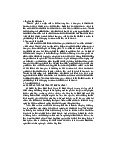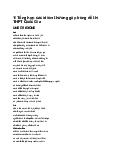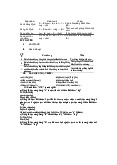

Preview text:
Name: Nguy n Th ễ ế Anh Student ID: 2214710012 ASSIGNMENT #1:
Voter apathy has received a lot of attention recently in the political sphere as a
potential threat to democracy. There are two strong arguments made in the Patterson excerpt:
the first underlines the consequences of rising voter apathy for democratic nations, and the
second emphasizes the importance of voting as a way to promote citizenship. This stimulating
conversation encourages us to reflect on our own stance and sympathies toward these ideas
while also acknowledging the possibility of different points of view. This essay will go into
these viewpoints, assessing which argument resonates better and providing possible
explanations for why others might have opposing views.
First, voter apathy poses a significant threat to the foundations of democracy, as
Patterson mentions in the excerpt. When a significant portion of the population does not vote,
the election outcomes may not accurately reflect the will of the entire population. This can
lead to the underrepresentation of certain demographics or groups, potentially skewing policy
decisions. Moreover, low voter turnout can result in policies that do not adequately address
the concerns and needs of all citizens. Elected officials may prioritize the interests of those
who do vote over those who do not, which can lead to inequities. In addition, politicians may
feel less accountable to the electorate when voter turnout is low, potentially leading to a
decline in government responsiveness and accountability.
Second, as Patterson argues in the excerpt, voting can strengthen citizenship in some
ways. Personally, I kind of emphasize more with this argument due for various reasons. A
high voter turnout ensures that elected officials are chosen by a more diverse and
representative cross-section of the population, which is crucial for the health of a
representative democracy. In addition, elections with high participation rates tend to be seen
as more legitimate, reducing the risk of political instability and unrest. Besides, elected
officials may be more responsive to the needs and concerns of a broad spectrum of voters
when voter turnout is high. And the final reason is that voting can serve as a gateway to
increased civic engagement. Engaged citizens are more likely to participate in other forms of
political and community involvement.
Although I find the argument that voting strengthens citizenship considerably
appealing, it is important for me to acknowledge alternative perspectives and reasons why
some individuals may not fully sympathize with this viewpoint. In my opinion,
disillusionment with the political system is one factor in disagreement. Some people might
believe that voting is a poor way to make substantial changes or deal with systemic problems.
They can contend that influential interest groups control the political system or that elected
officials don't care about the demands of the populace. As a result, they could see voting as a
pointless activity that just serves to maintain the present status rather than bringing about real change.
In conclusion, we can promote a more inclusive and informed conversation about the
importance of voting in democratic societies by being aware of the potential sources of
disagreement. In the end, this research challenges us to evaluate our own perspective while
acknowledging the complexity of this broad subject.




